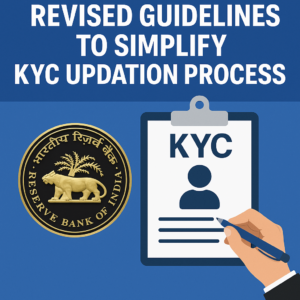
In a move aimed at easing the Know Your Customer (KYC) compliance burden on customers, the Reserve Bank of India (RBI) has released revised instructions to streamline the process of KYC updation across all regulated entities (REs), including banks. The circular is intended to address the significant backlog in periodic KYC updates, especially in accounts linked to Direct Benefit Transfer (DBT), scholarships, and the Pradhan Mantri Jan Dhan Yojana (PMJDY).
To enhance convenience, the RBI has now allowed Business Correspondents (BCs) to assist customers in KYC updation. This step is expected to significantly benefit rural and semi-urban populations who may have limited access to banking infrastructure.
Banks have been directed to organise dedicated KYC updation camps and run awareness campaigns, particularly in branches facing large pendency.
Customers can now update their KYC through self-declarations confirming “no change” or “change in address only.” These can be submitted via registered email, mobile numbers, ATMs, digital platforms, or physically through bank branches and BCs.
The RBI reiterated its approval for various modes of KYC:
- Face-to-Face: Including Aadhaar-based biometric e-KYC with self-declaration for alternate addresses.
- Non-Face-to-Face: Aadhaar OTP-based authentication with additional monitoring and compliance within one year.
- Video KYC (V-CIP): Treated on par with in-person verification, allowing secure video-based onboarding.
- Digital Integration: Use of KYC Identifiers and documents via DigiLocker and other digital means.
The RBI has also instructed banks to keep KYC records current by updating them automatically upon receiving updates from the Central KYC Registry (CKYCR).
For further details, regulated entities and customers can refer to the Master Direction on KYC and the latest amendments available on the RBI website.







